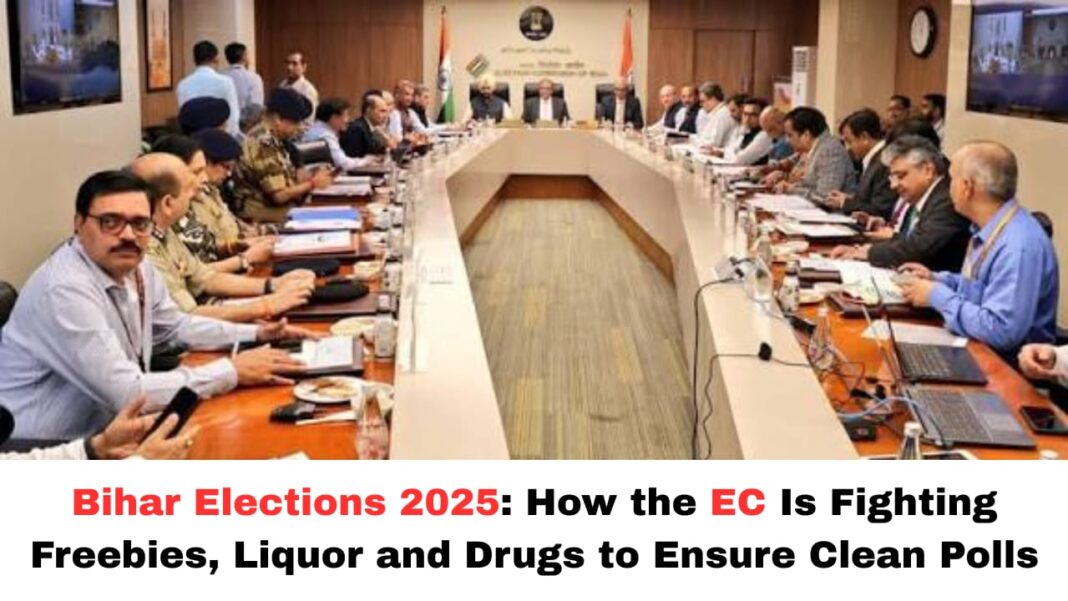Digital News Guru Bihar Desk:
Money-Power Ban in Bihar: EC of India Orders Enforcement Agencies to Halt Cash, Liquor and Drug Inducements
- The ECI has issued strict directives to all enforcement agencies — including state police, excise, income tax, customs, narcotics control, etc. — to proactively monitor and prevent the use of cash, liquor, drugs or other “freebie” inducements that may influence voters in the Bihar elections.
- Since the election notification on 6 October 2025, and with the Model Code of Conduct (MCC) in effect, authorities have made large seizures of cash, liquor, drugs and freebies across Bihar. Figures cited include approx Rs 33.97 crore seized so far.

- Specific operations: For example, in West Champaran district a seizure of Rs 6.28 lakh in cash was made during a vehicle check under the surveillance of the Special Surveillance Team (SST) and CAPF (SSB) meant to enforce election-laws.
- The ECI emphasised a “zero tolerance” policy and asked agencies to map sensitive constituencies—especially those near the India–Nepal border—where illicit goods or cash may flow more easily.
- Mechanisms: The ECI has activated tools like the “Election Seizure Management System” (ESMS) for real-time reporting of seizures by flying squads and static surveillance teams, and encouraged citizen-reporting via its C-Vigil app.
Why this matters
- When large amounts of unaccounted cash, liquor, drugs or freebies enter the electoral process, they can distort the fairness of elections: influencing voters through illegally funded inducements undermines the democratic process.
- Bihar’s assembly election is significant: Two phases are scheduled (on 6 Nov and 11 Nov, 2025) with counting on 14 Nov.
- By intensifying enforcement before polling day, the ECI seeks to reduce last-minute undue influence, thereby enhancing electoral integrity.
- The crackdown signals to political parties and candidates that oversight is heightened; this could deter illicit behaviour or force shift to more transparent campaigning.
- For the citizen/voter, this means a better chance of exercising the franchise without being swayed by unlawful inducements.

Challenges & Things to Watch
- Enforcement effectiveness: Monitoring every constituency, vehicle check-point, border area (especially the open India-Nepal border) remains a massive logistical task.
- Transparency & follow-up: Seizures are the first step; the next is prosecution, linking seized funds/goods to parties or candidates, and ensuring accountability.
- Candidate/party adaptation: If traditional inducement vectors (cash, liquor) become harder to deploy, new subtler forms might emerge (freebies, services, etc.). The ECI will need to monitor such shifts.
- Public awareness & vigilance: Citizens’ use of the C-Vigil app, flying squads doing visible checks, and media visibility will help deter illicit behaviour.
- Voter turnout & trust: If voters perceive the process as fair (less inducement, less coercion), confidence in the democratic process may rise; conversely, perceived loopholes may fuel cynicism.
Impact & Key Takeaways
- The Rs 33.97 crore (or more) of seized goods so far demonstrates scale: cash + liquor + drugs are being targeted in earnest.
- The mapping of high-risk constituencies (border areas, smuggling routes) and the coordination of multiple agencies show a multi-pronged approach by the ECI.
- Voters in Bihar should know: if they witness suspicious activity (cash/gifts/large amounts of liquor being distributed in their localities ahead of polling) they can report via C-Vigil or similar channels.

- Political parties/candidates: must account for campaign spending, maintain transparency, and avoid inducement-related violations, as surveillance and technology (ESMS, flying squads) are more active than before.
- The broader signal: This action by the ECI is part of a larger trend in India of tougher oversight of money-power and inducements in elections—something that could shape electoral culture over time.
Concluding thoughts
The crackdown ahead of the Bihar assembly elections demonstrates the Election Commission’s intent to ensure that contests are less about money and inducements and more about issues, representation and voter choice. However, the real test will lie in enforcement on the ground, visible deterrence, and accountability post-seizure. If the process works effectively, the Bihar polls could serve as a benchmark for cleaner elections in other states too.
You May Also Read: Gujarat Cabinet Reshuffle 2025: Harsh Sanghavi Becomes Deputy CM, Rivaba Jadeja Joins as MoS








